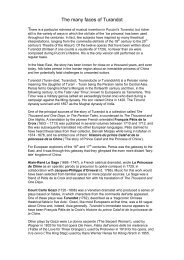NEF-Southampton-Positive-Money-ICB-Submission
NEF-Southampton-Positive-Money-ICB-Submission
NEF-Southampton-Positive-Money-ICB-Submission
You also want an ePaper? Increase the reach of your titles
YUMPU automatically turns print PDFs into web optimized ePapers that Google loves.
In contrast, under full-‐reserve banking, the risk of any investment now stays with the bank and the investor,<br />
rather than falling on a third party (i.e. the taxpayer).<br />
In some accounts, the risk will fall enGrely upon the bank, while on others a large proporGon of the risk will<br />
fall on the investor. The exact balance of risk sharing will be determined by the ‘Investment Account<br />
Guarantees’ outlined in Appendix 3. Any investor opening an Investment Account will be fully aware of the<br />
risks at the Gme of the investment, and those who do not wish to take the minimum amount of risk will be<br />
able to opt for an (almost) no-‐risk -‐ and consequently low-‐return -‐ account.<br />
Addressing the Too-‐Big-‐To-‐Fail & Too-‐Systemic-‐To-‐Fail Problems<br />
Under full-‐reserve banking, any bank can be allowed to fail, regardless of its size. A bank can be wound down<br />
in the following way:<br />
·∙ TransacGon Accounts, being fully funded with central bank money and not held on the balance sheet,<br />
would be transferred to other banks (with the customer nominaGng the new bank that they want to<br />
move to). In pracGcal terms and with intelligent design of the computer systems, this process could<br />
be completed within days of a bank’s collapse and TransacGon Account holders should not experience<br />
more than an hour when they are unable to access their money.<br />
·∙ Investment Account holders would become creditors of the bank and need to wait to recover as<br />
much of their investment as possible through normal liquidaGon proceedings.<br />
·∙ At no point would taxpayer’s money need to be spent on compensaGon or covering the liabiliGes of<br />
the bank.<br />
Enhancing compePPon and reducing barriers to entry in retail banking and payment services<br />
Under full-‐reserve banking, a new bank entering the banking system should not create an ongoing addiGonal<br />
workload for the Bank of England, beyond the iniGal setup process. If the Bank of England’s computer<br />
systems are designed well at the point of making the switch to full-‐reserve banking, it should be possible to<br />
very easily connect a new bank to those systems and not require any further human intervenGon on the part<br />
of the Bank of England.<br />
This ‘plug and play’ ability for a new bank to become part of the mainstream banking system should reduce<br />
the costs to the Bank of England of dealing with commercial banks. This would help to reduce the barriers to<br />
entry for new banks, and would therefore help to increase compeGGon in the sector. In parGcular, we would<br />
hope to see it made much easier for new, TransacGon Account-‐only banks to enter the market to increase<br />
compeGGon in the provision of this core payments system service. As well as new limited company retail<br />
banks, this could include credit unions, tradiGonal building socieGes, mutuals and Community Development<br />
Finance InsGtuGons (CDFIs) which currently struggle to compete for high street retail custom because they do<br />
not have the same ‘credit-‐creaGng’ powers of banks nor the ability to cross-‐subsidize their retail operaGons<br />
through income from investment banking acGviGes (Werner 2009). 6 As the FSA recently suggested:<br />
“Current accounts are of course only one part of the services provided by banks. Cross-‐subsidisaGon<br />
arises in the retail banking business model not just through packaged products, but in other ways. The<br />
model is based on providing a range of services such as deposit-‐taking, savings accounts, home loans,<br />
unsecured credit, and insurance. Cross-‐selling and cross-‐subsidisaGon are integral to this model, and<br />
the advantages of offering a poryolio of services can have major effects on the scope for entry. It would<br />
be very challenging for firms to enter and compete solely as deposit-‐takers against banks providing an<br />
integrated poryolio of services. Similarly, it would be difficult for a firm to enter the loan market<br />
6 While only about 0.5% of the adult populaAon in the UK is member of a credit union, the equivalent figures for Ireland,<br />
the US, Australia and Canada are 45%, 30%, 20% and 16%, respecAvely (Werner 2009)<br />
13



